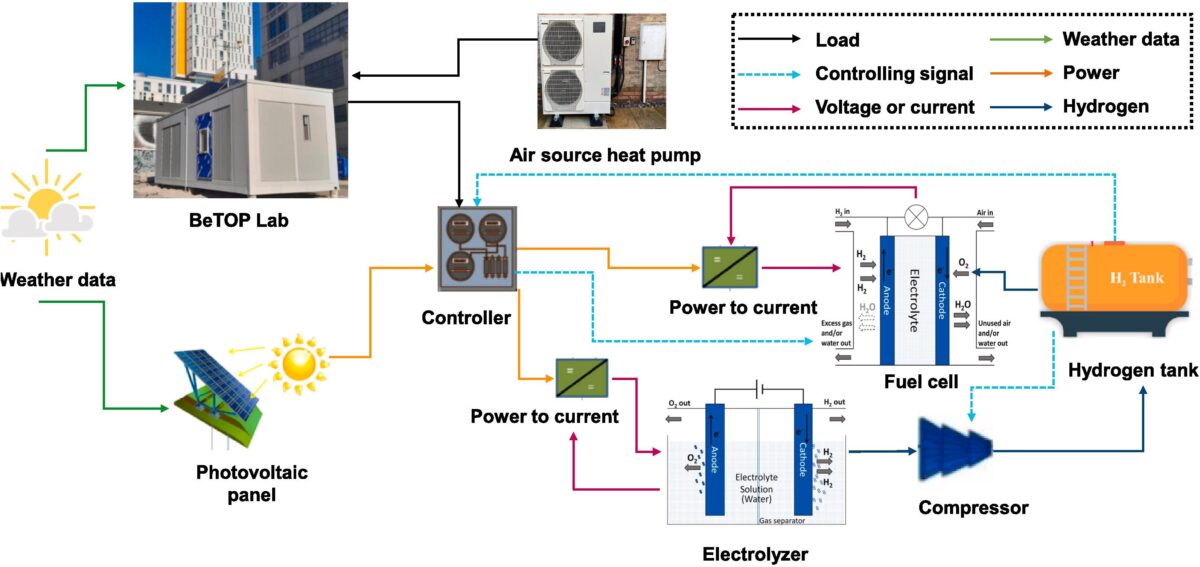Researchers from the Toronto Metropolitan University have proposed to combine hydrogen fuel cell systems with rooftop PV generation in building applications.
They tested the configuration of such a hybrid system at the BeTOP laboratory, which is located at the university's campus in Toronto, to gain insights into the potential application of hydrogen as a seasonal storage strategy in buildings.
The proposed system includes photovoltaic panels, an alkaline electrolyzer, a compressor, a gaseous hydrogen storage unit, a fuel cell system, inverters, and a control system regulating energy distribution within the system. The building also hosts air-source heat pumps for heating and cooling, as well as a hydronic radiant floor system.
“The PV system generates the electrical energy, and the considered control unit monitors whether the produced energy can cover the building load, including the heating and cooling demand provided by the air source heat pump system,” the scientists explained. “In case of surplus energy generation, the electrolyzer unit produces the hydrogen and, upon demand, the stored hydrogen is transferred to the fuel cell unit generating electricity to cover the power deficit of the system.”
The hydrogen generated by the electrolysis unit is stored in a gas storage tank at a temperature of 20 C and then utilized by the fuel cell depending on the building's electricity demand.
The group modeled the hybrid system with TRNSYS software, which is used to simulate the behavior of transient renewable systems, and utilized the response surface method (RSM), which is commonly used to predict the relationships between several explanatory variables and one or more response variables, to simulate the performance of the proposed system.
The analysis showed that the electrolyzer operates at lower efficiency during winter, due to the low solar radiation levels, while in summer time it achieves maximum production, with the state of charge (SOC) of the sytem increasing significantly between May and August.
“The results indicate that the hybrid system in June and July has its minimum grid dependency with only 33.2 kWh and 41.3 kWh of grid electricity usage, respectively, whereas in December, more than 88 % of the required load should be supplied by the grid,” the researchers explained.
Popular content
The simulation also stressed the need for storing PV electricity via electrolysis in the summer period, as solar power generation exceeds 2.5 times of the required building load.
“The results indicate that the electrical energy produced by fuel cell in the summer period corresponds on average to 31 % of the electricity production by PV cells,” the research group stressed. “It is also noteworthy to mention that a higher amount of energy production by fuel cell in January compared to that by PV system is attributable to the initial level of the hydrogen storage tank at the beginning of simulations.”
The academics also found that the ideal system configuration for the selected building would require 39.8 m2 of solar panels integrated with a 3.90 m3 hydrogen storage tank. They also ascertained the hybrid system may achieve a levelized cost of energy (LCOE) ranging from $0.389/kWh to $0.537/kWh.
The novel system was described in the study “Net-zero energy management through multi-criteria optimizations of a hybrid solar-hydrogen energy system for a laboratory in Toronto, Canada,” which was recently published in Energy and Buildings.
“It will be useful to conduct a comparative investigation between the techno-enviro-economic performance of this study and the alternative of using battery energy storage systems (BESS),” the scientists said referrring to the future direction of their work. “This analysis can also be extended to the case of employing both hydrogen storage and BESS with proper economic optimization to minimize the aforementioned costs.”

This content is protected by copyright and may not be reused. If you want to cooperate with us and would like to reuse some of our content, please contact: editors@pv-magazine.com.



Congratulations for the idea and the integrated solution. Integrating hybrid panels to produce electricity and solar hot water will complement the large consumption of energy.